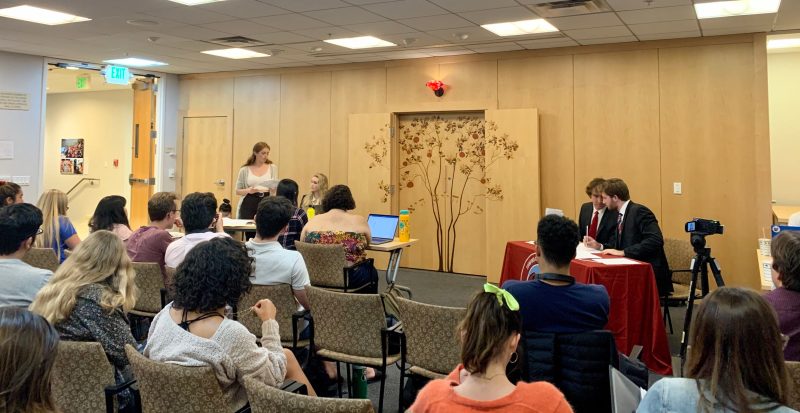The Stanford College Republicans (SCR) and the Stanford Democrats squared off over U.S. gun policy on Wednesday night at Stanford in Government’s (SIG) first campus debate of the year. The event, which was co-sponsored by Stanford Debate Society (SDS), saw two of Stanford’s foremost political organizations discuss gun legislation, with SCR supporting gun rights and the Democrats calling for greater gun control.
Around 100 students attended the event, which was moderated by Rachel Kim ’22 of SIG and Ari Gabriel ’23 of SDS. Representing SCR was Michael Whittaker ’20 and Tristin Rice ’22, and for Stanford Democrats, Ria Calcagno ’22 and Emily Schrader ’23.
“Through this discourse we can find common ground and develop policy to save lives across the country,” Calcagno began. In her opening statement, she cited the recent tragedies in Gilroy, Calif. and Dayton, Ohio as examples of the dire need for gun control to prevent mass atrocities.
SCR, on the other hand, opened by presenting the historical precedent and importance of the Second Amendment to American values. Citing the dangers of a disarmed society, Whittaker stated that surrendering the right to bear arms would be the choice of “cowards and fools.”
The Stanford Democrats, who spoke first, laid out their agenda of the five most pressing policies they hope to see implemented at the national level in order to effectively curb gun violence in the U.S. These policies included the banning of assault weapons, introduction of universal background checks and repealing of the Dickey Amendment, which prohibits the use of the Center for Disease Control’s federal funding to be used towards research which promotes gun control.
These notions were strongly rebutted by SCR, who cited self-defense and the defense of American rights and values as reasons against gun control.
“Getting rid of guns in the United States would not make it a safer place, but instead create a constitutional crisis,” Rice said. Rice and Whittaker suggested that the suspension of the right to bear arms would lead to the suspension of other rights as well.
“If we are willing to give up just one of our rights, we will one day wake up to a world where we have none of them,” Rice continued.
SCR also posed an argument that banning guns will only disadvantage responsible gun owners, as criminals will still be able to illegally obtain firearms.
“The reasoning of [our opposition and the NRA] is a prescription for chaos,” Schrader said, asking if SCR would use this logic to dismiss the utility of any law.
The debate was also co-sponsored by Stanford March for Our Lives and included special attention to the phenomenon of school shootings. While SCR advocated for the arming of teachers in order to protect students, Stanford Democrats countered this point, citing a national survey in which 73% of participating teachers were opposed to this measure.
Instead, the Democrats expressed support for strict background checks and the passage of extreme risk protection orders. Also known as ‘red flag laws,’ these orders give empower families and law enforcement to withhold access to guns from people deemed to pose a risk to themselves or others.
“Clearly these policies can and will reduce risk to schools,” Schrader said.
In their closing statement, SCR reiterated their stance that the Second Amendment is integral to American freedom, and compromising this right would weaken civilians against the “tyranny of the majority,” while creating the possibility for the suspension of other rights.
“Gun rights are foundational to a free society,” Whittaker concluded. “The measures proposed by our opponents are idiotic, immoral and positively counterproductive.”
“You can’t hide behind the pretext of patriotic speech,” Schrader said in response.
While the two parties disagreed on policy, they both felt that SIG debates were effective in sparking on-campus conversation and promoting dialogue among students.
“The only way that positive change will be made is if everyone becomes informed and engaged in dialogue,” Calcagno concluded.
This article has been updated to reflect that Rachel Kim ’22 of SIG and Ari Gabriel ’23 of SDS moderated the debate. The article has been corrected to attribute a quote to SCR representative Tristin Rice. The Daily regrets these errors.
Contact Brooke Beyer at bbeyer ‘at’ stanford.edu
